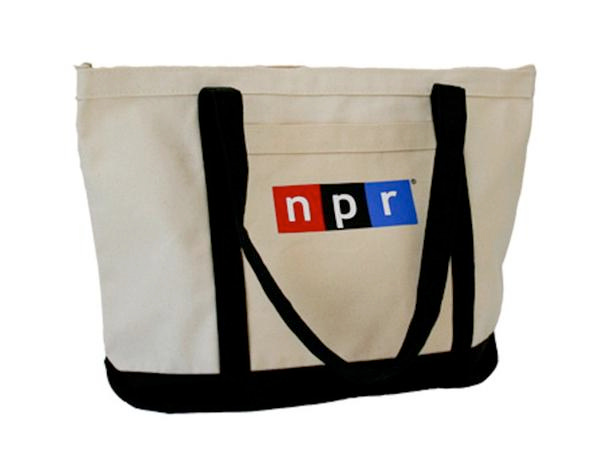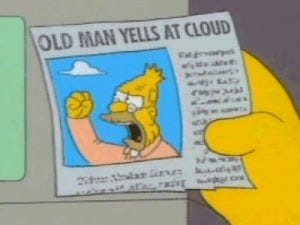So What, Who Cares (vol 2, issue 91) Why old city regulations are yelling at clouds

Hello! The tote bag story continues to unfold: alert reader @missrrg sent me a link to a Money magazine brief reporting on researchers' discovery that people who tote their own bags to grocery stores are so high on their own virtue, they reward themselves with more junk food than shoppers who are using store-provided bags.
I'll let you all confirm or deny that research observation qua your own experience, but let me remind you all: I love getting links from you, so please do not hesitate to send them via Twitter and email.
*

Some time between now and September 1, Chicago residents will begin paying a 9% "cloud tax" on digital entertainment streaming services, a move expected to bring the Windy City an additional $12 million a year in revenue thanks to Netflix subscribers, Spotify subscribers and online gamblers. The city administration's official stance is that this tax is merely a clarification of an existing "amusement tax" statute on the books. A second 9% cloud tax is also being levied on businesses who have "nonpossessory computer leases," i.e. subscriptions to cloud services, databases like LEXIS-NEXIS or the Multiple Listing Service, or software-as-a-service tools like Office 365.
So what? Chicago has become the first city in the U.S. to claim that it deserves revenue from businesses that are not based in the city, but merely used by people or businesses within Chicago. You can bet other municipalities are going to watch how this works and if they can set up similar regulation. One of the side effects of the shift to streaming media has been the shuttering of the brick-and-mortar record and video-rental stores that used to pay business licensing fees and taxes. Cities are looking for ways to rebuild their municipal tax base based on what's consumed within city limits, not just what's created there.

Who cares? Other than Chicagoans who are trying to find a new billing address outside Cook County? Businesses in Chicago, especially start-ups who have been relying on cloud-based service providers to keep their operational costs low, are now at a competitive disadvantage relative to similar companies that don't have an additional 9% tax burden.
Legal scholars are going to be watching this one closely, because as of right now, there is no legal framework for taxing cloud services in the U.S. and the inevitable lawsuits that will hit -- one law firm dryly notes that Chicago's move here is likely to catch the attention of people who think it violates the Federal Telecommunications Act, the Internet Tax Freedom Act, and state and/or federal limits on taxation -- will define exactly who gets to tax cloud-based businesses, and on what grounds.
*

Your pop-culture note of the day: I just recorded a Comic Book Club podcast with The Incomparable about The Runaways (issues 1-18), which hit comic book stores back in 2003.
At one point in the podcast, I was trying to put the series into context: In 2003, comic-book sales were tanking, and one of the strategies Marvel tried was to appeal to girls. Their play? Purse-sized comics that drew heavily from the manga aesthetic and featured a lot of girl-led titles. The imprint, Tsunami, went down fast but Brian K. Vaughn's initial run on Runaways is great and you should stalk our podcast page to see when this episode goes up.
Anyway, the point to that introduction is to show what amazing changes have taken place in the comic book industry over the past decade or so: a rich brew of cinematic successes, TV series, Tumblr fandom and exciting writers have blown the NO GIRLZ ALOWED sign off the comic-book clubhouse.
One of the most exciting writers to blow through comics in the past decade is Kelly Sue DeConnick, who reinvented Carol Danvers for the Marvel line the same way Gail Simone rehabbed the Black Canary for DC back in the Aughties via her great, not-talked-about-nearly-enough run on Birds of Prey.

This Vanity Fair profile of Kelly Sue DeConnick is a great read for non-comics readers who want a cocktail-party précis on why it's a really exciting time to watch the comics industry right now.
Side recommendation: My first exposures to Kelly Sue DeConnick was not through comics, but through her invention of "the uberlist," or the grand annual list of items you hope to do every year. Greg McElhatton ran DeConnick's explanation of it:
I think I only accomplish about 30% of the list in any given year (one year, I didn’t finish MAKING THE LIST) and generally by June there are a good 10 items that are no longer applicable or even desirable, but it’s a fun thing to have nonetheless, and it keeps me focused for the first few months of the year. Then I forget all about it until about, oh, say, NOVEMBER, at which point I scramble about trying to remember where I put last year’s list.
(I first found Greg writing about the uberlist notion in late 2003, blogged about it for the next few years and still do a private uberlist for myself annually.)
De Connick's former roommate Nikol Lohr sells eclectic and arty yearly planners that have room for your uberlist in the front -- well worth looking into if you love paper calendars and lists.
*
Are there typos? Copyediting is the only editing class I did not earn an A in. And I can't change any typos in the archives. I know. It irritates me too.
Suggestions for links gratefully received -- hit me up via Twitter and email.
Feedback is welcome. Again --hit me up via Twitter and email.
Really like this newsletter? TELL A FRIEND TO SUBSCRIBE! Then you can make pointed comments about how some people like receiving expressions of gratitude after they've passed on life-improving tips and oh, look, you have a bit.ly link for your Amazon wishlist right here!

